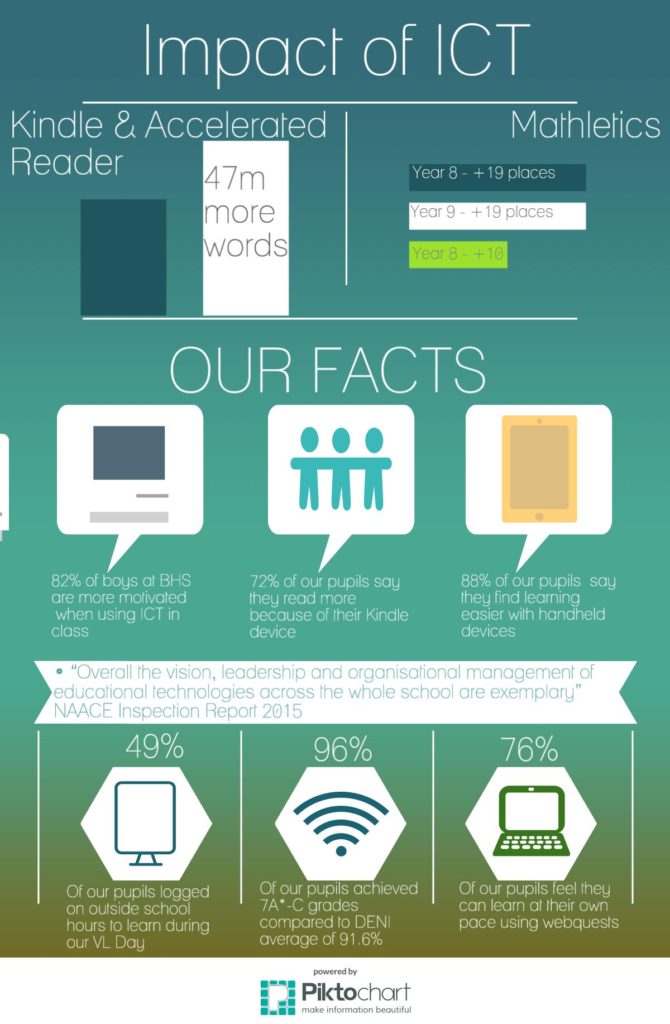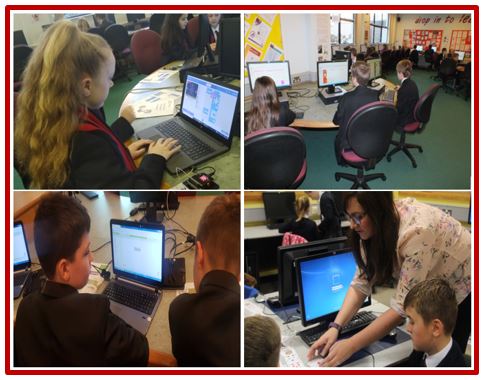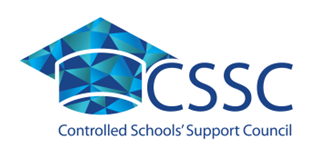ICT Strategy Group
The Educational Technology Strategy Group (ETSG) is responsible for overseeing the strategy relating to the development of ICT within our school. This group is comprised of the Principal, senior team members, Head of ICT, Systems Manager, the e-Safety Officer and representatives of departments across the curriculum. The chairperson is Mr G Shaw. The group meets fortnightly to implement our vision for ICT, review progress and plan to accommodate future developments. The main focus is on how pedagogy can drive our decision making relating to the development of technology. The central tenet that educational technology is integral to learning and achievement has been embedded within our initial six point guiding principles. The key aims of the 6-point plan are to:
Enhance learning experience;
Inspire, challenge and support teachers;
Develop infrastructure;
Prepare & implement curriculum change;
Manage learning more effectively;
Collaborate to meet community needs and share effective practice
The work of the ETSG group in Ballyclare High School has been verified and validated by a number of external agencies leading to awards named below;
* 2001 Institute for IT Training Silver Award (UK-wide)
* 2002 Institute for IT Training Gold Award (UK-wide)
* 2006 ICT Excellence Awards (UK wide)
* 2006 – 2011 ICT Specialist School
* 2007 & 2010 National Training Awards (UK wide & national)
* 2007, 2012 & 2015 ICT Mark (1st in NI)
* 2012 3rd Millennium Learning Award (1st in NI)
* 2015 E-safety Mark (1st in NI)
* 2015 Intel World Visionary ICT Teacher (1 of 40 in world) (1st in NI)
*2017 Digital School House Award

Leadership
This vision, and its implementation, has provided purpose and direction for the group and it has been recognised as being ‘exemplary’ (ETi, October 2006). As the first school in NI to achieve NAACE’s ICT Mark the assessor recognised our “outstanding pedagogically driven ICT vision” (ICT Mark feedback, 2015). Also the ETI commented on the key strengths of leadership and self-evaluation in the school being the:
- committed leadership of the Principal, supported effectively by the ETSG, who have a clear vision for innovation and the development of ICT in the school;
- distributed leadership for ICT across the school and the commitment of the staff to self-evaluation and improvement;
- creative approaches to the use of ICT in learning and teaching and the embedding of the specialism across the learning areas;
In the 2006 ICT Excellence Awards we were awarded joint winner of the UK-wide Best Whole School category. The award acknowledged our internal strategies but also our outward focus and ICT-related community links. This was underlined by an inspection report which recognised that as an impact of our ICT community plan we had “developed very effective links with the local community, including the local primary schools and community groups” (ETi, 2009). Also our ICT Mark assessor, noted “the exemplary work BHS was undertaking in extending its ICT expertise and facilities to the broader community” (ICT Mark feedback, 2007).
During our tenure as an ICT Specialist School, the implementation of the ‘six point plan’ was subject to annual internal evaluation. Over the years ICT has become more thoroughly embedded within everyday practice. So the ETSG’s guiding principles have become fully integrated within our School Development Plan. In 2015, we updated our ICT Mark for the third consecutive time, the Assessor noted that “Technology is at the heart of BHS, being embedded seamlessly into the daily routine and playing a ubiquitous role in the teaching and learning process. The school has a clear vision for sustaining their goal to “encourage life-long learning in a caring, creative community” and has implemented a number of initiatives to support these aspirations” (ICT Mark feedback, 2015). These initiatives include:
- supporting practice to improve pupil learning experiences
- achievement/engagement through mobile devices
- student driven safeguarding i.e.ChildNet Digital Leaders (1 of 6 UK schools), ENABLE Anti-Bullying Ambassador

Use of Technology
Our Specialist School status provided access to resources that allowed the ETSG to actively support the development of ICT as a whole school cross-curricular issue. This support took a number of forms, such as infrastructure (e.g. an Interactive Whiteboard (IWB) in every learning area) & training (recognised by National Training Awards in 2007 for our in-house training scheme and again in 2010 for our work with our primary school community partnership). Accordingly, the ETi highlighted “the commitment of the staff to developing their own skills in ICT, their work to create excellent learning resources and the effective embedding of ICT across the areas of learning, which helps the pupils to become more effective learners” (ETi, 2009). More recently, our ICT Mark assessor noted that “overall the vision, leadership and organisational management of educational technologies across the whole school are exemplary” (ICT Mark feedback, 2015).
Strengths in cross-curricular ICT have allowed us to develop a number of accredited tasks across a wide range of subjects (including English, Geography, Home Economics, Modern Language, Art & Maths) for the delivery of CCEA’s KS3 UICT accreditation scheme. These tasks accommodate a range of levels from 4 up to 6 and are designed to make use of ICT resources in order to explore, express, exchange, evaluate and exhibit learning within the specific subject area. This KS3 scheme is delivered through subject classes, supporting ICT classes in Y8, 9 & 10 and through the use of off-timetable “blitz” days.
As well as nurturing the development of cross-curricular ICT, the ETSG also supports the effective use of new and innovative learning technologies. For example, in 2012 we were the first school in NI to achieve NAACE’s 3rd Millennium Learning Award. The award acknowledged good practice through embedding technology into classroom learning experiences. Our entry involved a number of key features including:
(1) Collaborative Clusters
- Whole school free wifi access
- Provision for pupils’ own devices
- Use of ICT clusters and group work
- INTEL education world partner school 2 in 1 device project 2016
(2) Blitz Days
- Off-Timetable days to work on ICT projects
- Extended ICT projects based in different subject areas
- Use of senior school buddies to help junior classes with IT projects
(3) Multimedia Projects
- Use of class sets of digital camcorders
- Digital Video editing
- Publishing multimedia projects on our VLE
- CultureTech Minecraft EDU scheme
- Google Expedition Pilot School
(4) IWB Presentations
- Interactive lessons using Interactive White Boards
(5) Promoting home links, via:
- VLE – Fronter
- Instant SMS programme
- Social Media Platforms: Facebook, Twitter, Instagram
- Website and E-Newsletter
Following research on pedagogical benefits of mobile devices, ETSG established a handheld devices (HHD) project. Since the first phase of this scheme, every Learning Area within the KS3 NI curriculum includes at least one teacher equipped with an iPad. Teacher support was delivered over the course of 2 months of workshops, with follow up tutorials made available via MySchool. Following an evaluation of the project in Dec, stage 2 was launched with a focus on raising achievement targeting stakeholders in Literacy, Numeracy, SEN and Learning Support.
A subsequent innovation supported by ETSG was the Kindle project which was designed to align core areas of the school’s development plan by implementing ICT to enhance teaching and learning, whilst nurturing boys’ academic development and embedding an interest in reading for early years. This project aimed to provide a Kindle for each Y8 student, facilitate its use as a learning resource across a range of classes and nurture an interest in reading for pleasure among all students.
Intel Education have partnered with Ballyclare High School to roll out a 2 in 1 device project. 1 of only 6 Intel Education projects across the globe, Ballyclare High School is using 2 in 1 devices in a ‘Blended Learning’ project. The tablet is used in the collection of primary data in fieldwork elements of subjects, the technology then provides real time feedback on trends and correlations via interactive charts and diagrams, driving deeper independent learning. The complete device is brought back in the classroom to write up findings with interactive content. The impact on pupils learning is then feedback to the Intel Education Global team. These findings will help inform new trends in hardware and applications in EdTech globally.
Supports Learning
Our focus on developing a pupil-focused pedagogy through the use of mobile devices was one of the factors that helped highlight pupil safety as a major issue that needed addressed. Our ICT Mark Assessor noted that “a notable whole school achievement was the development of the e-safety team into digital leaders and the subsequent award of the E-safety Mark”. We are proud of being the first school in NI to achieve this accolade and the recognition of being “a beacon school for e-safety in Northern Ireland” (E-safety Mark report 2015).
Over the years the traditional approach to ICT training has been challenged in an innovative manner at BHS. As well as having specialist training sessions, breakfast sessions and school based TeachMeet (to share good practice), we also provide “Blast” sessions on every SDD. These take the form of short videos to demonstrate a specific technological/educational innovation (e.g. new app). The wide range of Blast sessions are available via MySchool, providing flexibility to allow staff to train at differentiated levels, at a time, place and speed which best suits them. Also ICT is deemed to be an essential component of continuing professional development and it is subsequently incorporated into PRSD objectives. Historically, the school has often been acknowledged as a pioneer in disseminating good practice with ICT: in 2001 the national Institute for IT Training granted Ballyclare High School (in association with the Learning Schools Programme) a Silver award for the high quality of its staff training in relation to the effective use of IT across the curriculum. In 2002 the school secured the top (Gold) award for its achievements in this realm and this was also recognised in the Capita MITS Capita Excellence Award report 2015.
Impact on Pupils Learning
Following phase 1 of the HHD project in 2015, ETSG conducted a pupil survey to measure the impact of the pilot. The results provided reassurance that the educational benefits of mobile devices were tangible and approval for phase 2 of the project was agreed by ETSG. The initial evaluation concluded that:
- 91% of students bring an internet enabled device everyday
- 85% feel more motivated when using HHDs
- 89% feel they can ‘push’ themselves much easier using HHDs
- 84% of boys feel more engaged in their learning
As a result of the Kindle Project:
- Y8 rate of participation in Accelerated Reader book scores rose from 86% (2014) to 96% (2015);
- Y8 have read 47 million more words (93,431,068 in 2014 – 140,530,032 in 2015);
- Y8 have read, measurably, more demanding books (AR point score of 12,498 in 2014 rose to 18,430 in 2015);
- Evaluations reflect enthusiastic pupil views on the scheme (over 72% of pupils agreed or agreed strongly that their Kindles had encouraged them to read more – June 15).
In 2009 an ETI specialist schools inspection focused on the three main aspects of our specialism: ICT as a subject, whole school ICT and our ICT community plan. In each of the three aspects the inspection concluded that the implementation of each of the ETSG plans had provided “outstanding” improvements in quality and standards (ETi, 2009).
During our recent ICT Mark assessment a number of impacts of ICT on learning and teaching were noted including:
- Staged introduction of iPads and use of pupil mobile devices;
- Promoting reading, in particular raising boys’ literacy;
- Pedagogically driven staff training;
- Impact of sharing good practice (e.g. use of generic educational apps);
- Nurturing coding and programming;
- Use of the VLE to facilitate independent learning and stretch and challenge initiatives;
- Up-cycling outdated equipment from our local community and buisnesses;
- E-safety digital pupil leaders.
This report also recognised that ETSG’s pedagogical focus promoted technological transparency: “In general pupils do not ‘see’ the technology as it is embedded seamlessly into the classroom teaching. From a pupil perspective they benefit from the effects of ICT on pedagogy and how they learn” (ICT Mark feedback, 2015). The 2016 NAACE National Impact awards also recognised that “effective ICT is infused in all aspects of school life”. This recognition along with the advent of the Intel World education project, the future of transforming teaching & learning through technology in Ballyclare High School looks outstanding.

